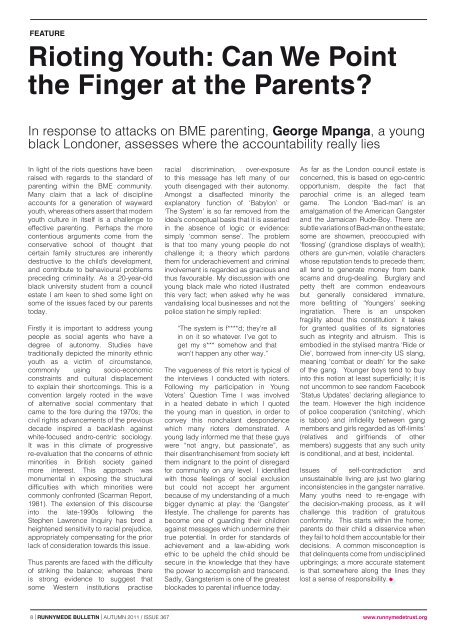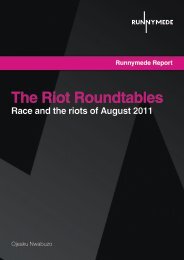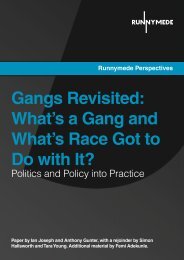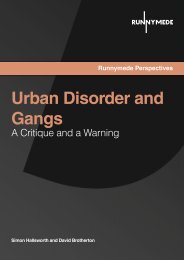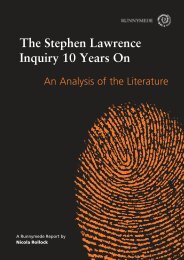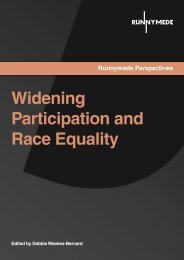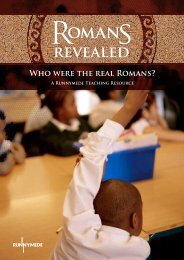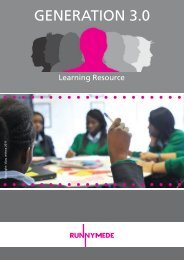PARENTINg - Runnymede Trust
PARENTINg - Runnymede Trust
PARENTINg - Runnymede Trust
You also want an ePaper? Increase the reach of your titles
YUMPU automatically turns print PDFs into web optimized ePapers that Google loves.
Feature<br />
Rioting Youth: Can We Point<br />
the Finger at the Parents?<br />
In response to attacks on BME parenting, George Mpanga, a young<br />
black Londoner, assesses where the accountability really lies<br />
In light of the riots questions have been<br />
raised with regards to the standard of<br />
parenting within the BME community.<br />
Many claim that a lack of discipline<br />
accounts for a generation of wayward<br />
youth, whereas others assert that modern<br />
youth culture in itself is a challenge to<br />
effective parenting. Perhaps the more<br />
contentious arguments come from the<br />
conservative school of thought that<br />
certain family structures are inherently<br />
destructive to the child’s development,<br />
and contribute to behavioural problems<br />
preceding criminality. As a 20-year-old<br />
black university student from a council<br />
estate I am keen to shed some light on<br />
some of the issues faced by our parents<br />
today.<br />
Firstly it is important to address young<br />
people as social agents who have a<br />
degree of autonomy. Studies have<br />
traditionally depicted the minority ethnic<br />
youth as a victim of circumstance,<br />
commonly using socio-economic<br />
constraints and cultural displacement<br />
to explain their shortcomings. This is a<br />
convention largely rooted in the wave<br />
of alternative social commentary that<br />
came to the fore during the 1970s; the<br />
civil rights advancements of the previous<br />
decade inspired a backlash against<br />
white-focused andro-centric sociology.<br />
It was in this climate of progressive<br />
re-evaluation that the concerns of ethnic<br />
minorities in British society gained<br />
more interest. This approach was<br />
monumental in exposing the structural<br />
difficulties with which minorities were<br />
commonly confronted (Scarman Report,<br />
1981). The extension of this discourse<br />
into the late-1990s following the<br />
Stephen Lawrence Inquiry has bred a<br />
heightened sensitivity to racial prejudice,<br />
appropriately compensating for the prior<br />
lack of consideration towards this issue.<br />
Thus parents are faced with the difficulty<br />
of striking the balance; whereas there<br />
is strong evidence to suggest that<br />
some Western institutions practise<br />
racial discrimination, over-exposure<br />
to this message has left many of our<br />
youth disengaged with their autonomy.<br />
Amongst a disaffected minority the<br />
explanatory function of ‘Babylon’ or<br />
‘The System’ is so far removed from the<br />
idea’s conceptual basis that it is asserted<br />
in the absence of logic or evidence:<br />
simply ‘common sense’. The problem<br />
is that too many young people do not<br />
challenge it; a theory which pardons<br />
them for underachievement and criminal<br />
involvement is regarded as gracious and<br />
thus favourable. My discussion with one<br />
young black male who rioted illustrated<br />
this very fact; when asked why he was<br />
vandalising local businesses and not the<br />
police station he simply replied:<br />
“The system is f****d; they’re all<br />
in on it so whatever. I’ve got to<br />
get my s*** somehow and that<br />
won’t happen any other way.”<br />
The vagueness of this retort is typical of<br />
the interviews I conducted with rioters.<br />
Following my participation in Young<br />
Voters’ Question Time I was involved<br />
in a heated debate in which I quoted<br />
the young man in question, in order to<br />
convey this nonchalant despondence<br />
which many rioters demonstrated. A<br />
young lady informed me that these guys<br />
were “not angry, but passionate”, as<br />
their disenfranchisement from society left<br />
them indignant to the point of disregard<br />
for community on any level. I identified<br />
with those feelings of social exclusion<br />
but could not accept her argument<br />
because of my understanding of a much<br />
bigger dynamic at play: the ‘Gangster’<br />
lifestyle. The challenge for parents has<br />
become one of guarding their children<br />
against messages which undermine their<br />
true potential. In order for standards of<br />
achievement and a law-abiding work<br />
ethic to be upheld the child should be<br />
secure in the knowledge that they have<br />
the power to accomplish and transcend.<br />
Sadly, Gangsterism is one of the greatest<br />
blockades to parental influence today.<br />
As far as the London council estate is<br />
concerned, this is based on ego-centric<br />
opportunism, despite the fact that<br />
parochial crime is an alleged team<br />
game. The London ‘Bad-man’ is an<br />
amalgamation of the American Gangster<br />
and the Jamaican Rude-Boy. There are<br />
subtle variations of Bad-man on the estate;<br />
some are showmen, preoccupied with<br />
‘flossing’ (grandiose displays of wealth);<br />
others are gun-men, volatile characters<br />
whose reputation tends to precede them;<br />
all tend to generate money from bank<br />
scams and drug-dealing. Burglary and<br />
petty theft are common endeavours<br />
but generally considered immature,<br />
more befitting of ‘Youngers’ seeking<br />
ingratiation. There is an unspoken<br />
fragility about this constitution: it takes<br />
for granted qualities of its signatories<br />
such as integrity and altruism. This is<br />
embodied in the stylised mantra ‘Ride or<br />
Die’, borrowed from inner-city US slang,<br />
meaning ‘combat or death’ for the sake<br />
of the gang. Younger boys tend to buy<br />
into this notion at least superficially; it is<br />
not uncommon to see random Facebook<br />
‘Status Updates’ declaring allegiance to<br />
the team. However the high incidence<br />
of police cooperation (‘snitching’, which<br />
is taboo) and infidelity between gang<br />
members and girls regarded as ‘off-limits’<br />
(relatives and girlfriends of other<br />
members) suggests that any such unity<br />
is conditional, and at best, incidental.<br />
Issues of self-contradiction and<br />
unsustainable living are just two glaring<br />
inconsistencies in the gangster narrative.<br />
Many youths need to re-engage with<br />
the decision-making process, as it will<br />
challenge this tradition of gratuitous<br />
conformity. This starts within the home;<br />
parents do their child a disservice when<br />
they fail to hold them accountable for their<br />
decisions. A common misconception is<br />
that delinquents come from undisciplined<br />
upbringings; a more accurate statement<br />
is that somewhere along the lines they<br />
lost a sense of responsibility.<br />
8 | RUNNYMEDE BULLETIN | Autumn 2011 / issue 367 www.runnymedetrust.org


